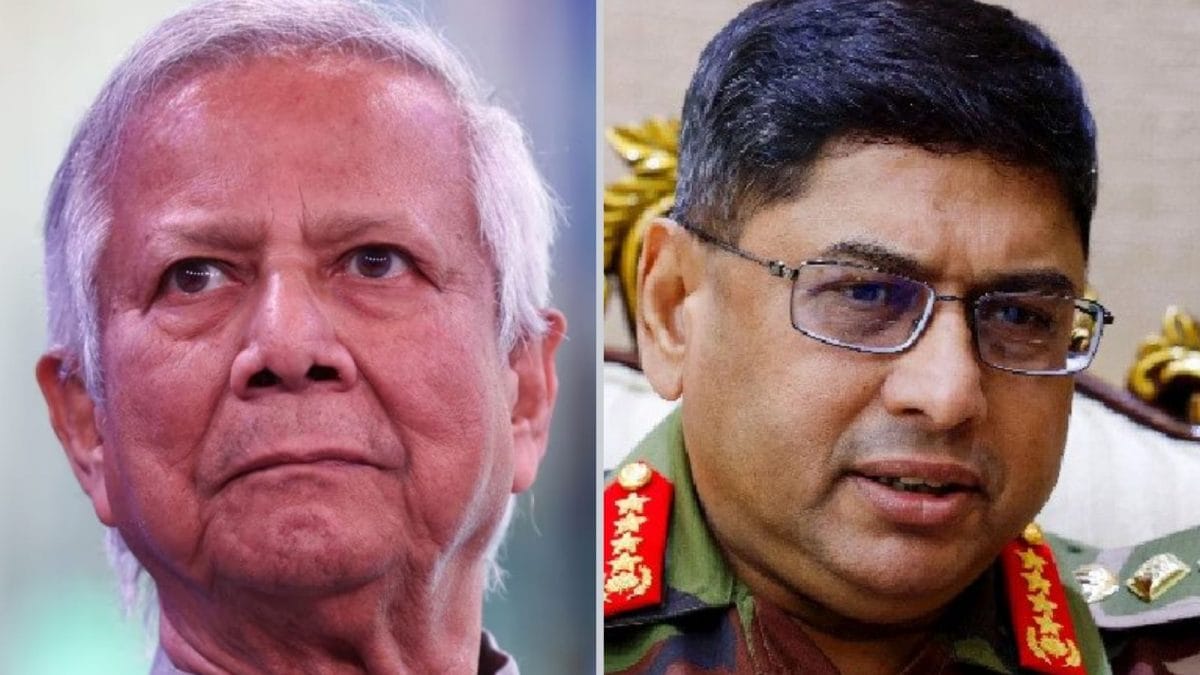Tensions Mount in Bangladesh: Yunus and Army Chief Clash Over Election Timing and Stability










2025-05-20T17:03:54Z

In a developing situation in Bangladesh, tensions are escalating between the country's interim government led by Chief Mohammad Yunus and Army Chief General Waker-Uz-Zaman. Reports indicate that General Zaman has urgently convened a meeting to discuss a “plan of action" regarding the upcoming elections, which he insists must be announced by Yunus without further delay. This demand by the Army chief underscores his growing concerns about potential instability within the nation, particularly in light of what many perceive to be foreign interference linked to Yunus's administration.
Sources from the Army revealed that General Zaman is particularly apprehensive about the political landscape shifting under Yunus’s leadership, given that Yunus is viewed by some as being heavily influenced by foreign entities. The Army chief’s immediate priority is to alleviate fears of unrest that could arise from this perception, prompting him to urge for a swift declaration of elections to stabilize the political climate.
In an effort to forge unity, General Zaman is reportedly attempting to bring together the political factions of former Prime Ministers Sheikh Hasina and Khaleda Zia, aiming to ensure a more competitive electoral environment. However, one of the Army's primary concerns remains Yunus's recent executive orders facilitating the release of prisoners, a move that has raised eyebrows among military leaders.
Furthermore, the Army chief's worry extends to the perceived division within the military itself, a division that may have been exacerbated by Yunus's controversial decision to appoint a National Security Advisor in the absence of direct input from the Army chief. This decision has led to speculation and concern within military ranks, particularly following a closed-door meeting between Quarter-Master General Lieutenant General Faizur Rahman and National Security Advisor Khalilur Rahman, a close ally of Yunus. This meeting is seen by many as a potential attempt to undermine the Army chief's authority, which has created significant unease among military commanders who are largely in favor of conducting elections swiftly.
General Zaman has made it clear that he will not yield to pressures from any civil groups, having taken steps to prevent protests from approaching his office or residence. Initially, he had attempted to support Yunus, but the growing threat of foreign interference has shifted his stance, leading him to advocate for immediate elections. In a bid to strengthen democratic processes, he has established backchannels with various political factions to facilitate a united front.
Looking at the broader implications, it's essential to note that General Zaman, appointed to his position in June 2024, is viewed as a leader with a balanced approach and a pro-India stance. In contrast, Lieutenant General Faizur Rahman, the Quartermaster General, is perceived as leaning towards pro-Islamist and pro-Pakistan sentiments, which puts him at odds with Zaman’s vision for the military and the country. This ideological divide within the Army may explain the recent tensions, which have further escalated with indications that Rahman has been courting external influences, including a meeting earlier this year with Pakistan's ISI chief, Lieutenant General Asim Malik.
The internal friction within the Army is not a new development, as reports have surfaced about factions supporting either the Awami League or the ISI, indicating a troubling rift that could jeopardize national stability. Some commanders have even suggested that attempts at a coup led by pro-ISI elements were thwarted by disciplined officers loyal to General Zaman. This persistent ideological struggle highlights the complexity of the current military and political landscape in Bangladesh.
General Zaman has publicly expressed his frustrations about the interim government's failure to restore stability. He advocates for a swift return of the military to its barracks once a semblance of order is reestablished, contrasting with Rahman’s apparent desire for a more pronounced military role that aligns with certain ideological or external agendas. In a foreboding statement, he cautioned of a potential coup and emphasized the need for the government to be in competent hands, signaling his readiness to intervene if necessary.
The situation remains fluid, with the Army chief's statements raising alarm bells about the country's sovereignty and independence as it navigates these turbulent waters. As the deadline for elections looms, the coming days will likely be pivotal in determining the future political landscape of Bangladesh.
 Maria Kostova
Maria Kostova
Source of the news: News18